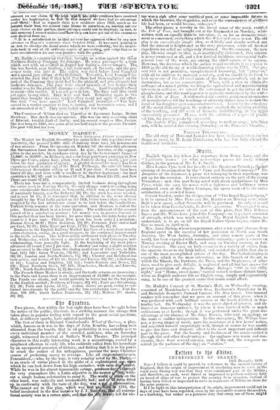..31ht5ir.
English Opera has talet n &pal-tine from Dully Lane, and the " legitimate drama" (or what now-a-da)'s passes for such) rctr.4,."6 thither, in the person of Mr. F. T. Smith.
;Miss Louioa Pyne took hex benefit at this theatre on Saturday, 1 .4pilast evening of its occupation by the O Pyue end Ilarrision ConspanyN' The Daughter of the leeyitnent, a piece aot belonging to their repertory, was got urfor the ocectaion. It rests almost entitely on the pert of-the young Vivandiere ; and, this part being acted with muck sprightliness by Miss Pyne, while she saw* the music with a lightness anti brilliancy never surpassed even- at the Opera. Comique, the opera went err to the entire satiSfaCtion of a crowded house.
Covent Gordon, under the designation of "The Royal English Opera," is to be opened by Miss Pync and Mr. Harrison on Monday next, when Balfe's new opera, called Ratanella. will be produced. Its subject is said to be taken from Casettes tale, Le Diable .1moureux. We are glad to see, front the announcement of the east of this ,piece, that Miss Rebecca Isaacs and Mr. Weiss have joined the Company—an important ancession of strength, which was much needed. '11)a Royal English Opera, wo understand, is to go on till the Royal Italian Opera begins, under Mr. Gye as usual, in April next. Mrs. Anna Bishop, whose reappearance, after a ten years' absence from England spent in the exercise of her profession in North awl South America the West Indies, Australia, and other remote parts of the world, has been expected with considerable curiosity,—gave a concert on Monday evening at Exeter Hall, and sang on Tuesday evening at Jul- lien's Concert. She sang on both occasions in a variety of styles, from the operatic Scene to the Irish ballad, and satisfied the public that she is one of the most accomplished artists of the day. Her ballad-singing is exquisite; which is the more interesting, as this branch of the art, in which the Blends, the Davisont, the Trees, and the Stephenses, of other days, used to give such delight, is neglected and all but lost anions-the present generation of singers. Madame Bishop's "Oft hi the stilly night," and "Home, sweet home," carried us back to those distant times, when an English audience felt an English song, simply and expressively sung, to be one of the greatest treats that music could afford.
Mr. Hullah's Concert at St. Martin's Hall, on Wednesday evening, consisted of hlendelssohn's Lauda Sion, Beethoven's Symphony in D, and Sterndale Bennett's Pastoral Cantata The May Queen. Our musical readers will remember that we gave an account of this piece, when it was produced with such brilliant success at the Leeds Festival in Sep- tember last. On Wednesday it was the great object of interest, and at- tracted an immense audience, by whom it was received with as much enthusiasm as at Leeds ; though it was performed under the great dis- advantage of the absence of Mr. Sims Reeves, who sent an apology on the score of sudden indisposition. In this emergency, Mr. Wilbye Coo- per, a young singer of merit, gave his assistance at a few hours' notice, and acquitted himself surprisingly well, though of course he was unable to give due force and dramatic effect to the most important and difficult part in the piece. But the beauty and freshness of the music curried it through this and other disadvantages : the applause was warm and con- tinuous, there *ere several encores, and, at the end, the composer re- ceived (in the parlance of the day) an "ovation."


























 Previous page
Previous page